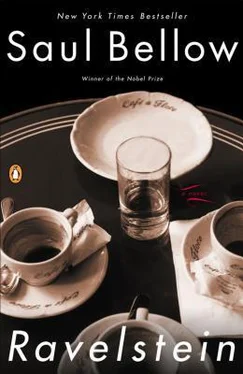Anyway, I should have anticipated that Vela would make a big thing of Ravelstein's "impropriety." She had been preparing to have it out with me over Abe, and his barging into our bedroom at the hotel gave her just the opening she was waiting for.
"I don't want to see him here again," she said. "I ask you also to remember that you promised to take me to Chartres."
"I said that I would. And of course I will take you-I mean, we'll go there together."
"And let's invite the Grielescus. They're old friends. Professor Grielescu will join us. Nanette wouldn't-she stopped taking such trips long ago. She doesn't like to be seen by daylight."
I had noted this myself. Mme. Grielescu had been a glamorous lady in her time one of those _jeunes filles en fleur__ you read about long ago. Grielescu was a famous scholar, not exactly a follower of Jung-but _not__ exactly not a Jungian. He was a hard one to place.
Ravelstein, who didn't bring wild charges against anybody, said that Grielescu was mentioned, by scholars who specialized in such things, as an Iron Guardist connected with the Romanian prewar fascist government. He had been a foreign service cultural official in the Nazi regime in Bucharest. "You don't like to think of such things, Chick," said Ravelstein. "And you're married to a woman who scares you. Of course you'll say she's a political ignoramus."
"About politics she understands very little…."
"Naturally, she believes that a scientist must be above and beyond such stuff. But these are her pals. We may as well look straight at the facts."
I said, "I will admit that Radu Grielescu sets the standards for male conduct in those East European circles."
"You mean the courtly gentleman bullshit."
"Yes, that's more or less it. The considerate man, the only right kind, remembers birthdays, honeymoons, and other tender anniversaries. You have to kiss the ladies' hands, send them roses; you cringe, move back the chairs, you rush to open doors and make arrangements with the maitre d'. In that set, the women expect to be petted, idolized, deferred to, or romanced."
"Those jerks playing _chevalier а votre service__?-Of course it's just a game. But the women get a kick out of it."
The trip from the Montparnasse Station to Chartres was fairly short. If I took Vela to view the cathedral, I'd prefer to do it on a market day in strawberry season. But Vela had no real interest in Chartres except to be taken there. She didn't give a shit about Gothic architecture or stained glass. She only wanted her will to be done.
"Vela sets all kinds of conditions for you to meet, doesn't she?" Ravelstein said. "Didn't she make you bring all her luggage?"
"That's true. I came via London."
"And she couldn't cancel some appointment back home, so you flew separately. And brought her party dresses…"
He didn't admire me for doing such errands. He made this super clear. The picture he had drawn of my marriage was anything but flattering. Writers don't make good husbands. They reserve their Eros for their art. Or maybe they just don't focus. As for Vela, he judged her even more severely. "Maybe I shouldn't have rushed into the bedroom." He granted that, but added, "There wasn't all that much to be seen. Anyway, I wasn't interested. She was far from ex posed. She had on her slip, and all kinds of other stuff under that. So what's all the hue and cry?"
"Protocol," I explained. Ravelstein disagreed. "No, no. Not protocol. It doesn't even look like protocol."
I don't often have a problem with words. What I meant to say was that she was simply not ready to be seen. Unless you had lived with her, you wouldn't know what she did in the morning with her hair, her cheeks, her lips (especially the upper lip)-the phases of her preparations. She had to be seen as a beautiful woman. But it was beauty-parade beauty, and required preparation at a West Point or Hapsburg hussar level. I will be suspected of prejudice. But I assure you that I am confronted with some very real oddities-I happen to be a serial marrier and I had here a problem of self-preservation.
Ravelstein said, "Doesn't Vela come from the Black Sea region?"
"What if she does?"
"The Eastern Danube? The Carpathians?"
"I can't place it, exactly."
"It's not too important," Abe said. "A grande dame on an Eastern European model. No modern Frenchwoman would put on such an act. Often people from Eastern Europe cling to France, they have no life at home, home is disgusting, and they need to see themselves in a French light only. This applies to somebody like Cioran or even our friend-your friend-Grielescu. They hope to turn into Frenchmen. But your wife is even more peculiar…"
I stopped him. It would leave me open to charges of disloyalty if I were to admit that she was indeed the very strange phenomenon he described. I saw her with the eyes of a lover. But not entirely. I also took a naturalist's view of her. She was a very beautiful woman. And I admitted also that certain aspects of her face reminded me of Giorgione. On a small map you could place Vela's origins in Greece or even Egypt. Of course a big-time intellect is a universal phenomenon, and Vela had a major league brain. The scientific part of it de served particular respect. Ravelstein, however, held that examples of great personalities among scientists were scarce. Great philosophers, painters, statesmen, lawyers, yes. But great-souled men or women in the sciences are extremely rare. "It's their sciences that are great, not the persons."
I must drop Paris now and get back to New Hampshire.
A few days in the country led me to conclude that Ravelstein's visit was proof of his affection. He didn't care about the fields, trees, pools, flowers, birds: These wasted the time of a superior man. Why did he give up his bank of telephones, his restaurants, and all the conveniences and erotic attractions of New York or Chicago? Because he wanted to see firsthand what was going on between Vela and me in New Hampshire.
One day was enough. "I've been watching," he said, "and I see she's got you staked out on an anthill," he said. "Don't you ever do anything together? Hiking?"
"No, come to think of it."
"Swimming?"
"At odd times she jumps in the neighbor's pond."
"Barbecues, picnics, visitors, parties?"
"Not her cup of tea."
"She can't talk to you about her central interests…" Ravelstein's big face was now very close. Holding his breath, he silently led me to consider it all from his point of view: Why did I submit to an ordeal of daily tensions which would never end?
All that Vela needed, as she often said, was to sit in a quiet angle with a notepad and draw her diagrams, knees up, breath held, and immobile. But she was all the while also directing negative currents toward me. The beauty of this New Hampshire corner with great maples and centuries-old hickories-the periwinkles and mosses in the shaded corners signified… well, to Vela they signified very little. She concentrated on her great abstractions.
"How do you figure in this?" said Ravelstein. "Do you maybe represent all that any man will ever get from her… So the fascinating question is whether she concentrates on her science or on her witch-work, because in your ignorance that's how it must seem."
That seemed to be a fair way to state the case.
"The regular pattern for her," I said, "is to pack up her things every few weeks, including her party clothes, because there are social gatherings as well as hard sciences. She drives away in her white Jaguar and attends science conferences up and down the Eastern seaboard."
"Would you say that, apart from the hint of rejection, there is also some relief for you when she goes?" Ravelstein could be sympathetic. But more often he speculated on my paradoxical oddities. "What do you get out of this place?" he would say. "This is sup posed to be your quiet green retreat where you think and work. Or at least advance your projects…"
Читать дальше












